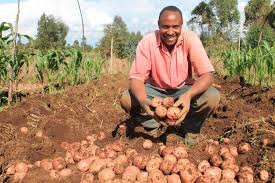Kenyan Farmers Embrace Late Blight Resistant Potatoes for Sustainable Agriculture and Enhanced Food Security
- Farmers and stakeholders gathered at the Agricultural Training Center (ATC) in Soilo, Kenya, on July 3, 2024, to discuss the potential introduction of Late Blight resistant potatoes developed using modern technology.
- The meeting focused on the Environmental and Social Impact Assessment (ESIA) study conducted by the Kenya Agricultural and Livestock Organization (KALRO), International Potato Center (CIP), and African Agricultural Technology Foundation (AATF), soliciting feedback from key players in the potato value chain.
- Charles Githiri, the Director for Agriculture in Nakuru County, highlighted the significance of adopting these resistant varieties to combat potato crop losses due to Late Blight disease, emphasizing their role in enhancing food security and reducing dependence on fungicides.
- The shift towards resistant potatoes is expected to not only lower production costs and increase profitability for farmers but also promote environmental sustainability by minimizing the use of harmful chemicals that can adversely impact ecosystems.
- Githiri stressed that these resistant varieties offer improved health and higher yields, making farming practices more sustainable and efficient while opening doors to international markets and boosting incomes for farmers.
- The adoption of Late Blight resistant potatoes holds the promise of fostering economic growth, environmental conservation, and social progress within Kenya‘s agricultural landscape, paving the way for a more resilient and prosperous future.







